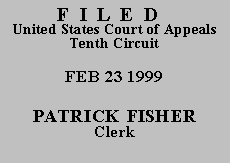

| EARL W. TALLEY, | |
| Petitioner-Appellant, | |
| v. | |
| TOM C. MARTIN, | |
| Respondent-Appellee. |
Petitioner seeks a certificate of appealability to appeal the district court's dismissal of his writ of habeas corpus filed pursuant to 28 U.S.C. § 2254. Proceeding pro se, Petitioner challenged his conviction in Oklahoma state court for making a false declaration of ownership to a pawnbroker after two previous felony convictions. Although Petitioner raised numerous arguments in his habeas corpus petition, the magistrate judge recommended that the petition be dismissed as untimely under 28 U.S.C. § 2244(d)(1)(A), even in light of all the available procedural and equitable tolling provisions. In its Order filed July 22, 1998, the district court adopted the magistrate judge's report and recommendation and dismissed the petition as untimely.
This court has carefully considered and reviewed Petitioner's application for a certificate of appealability, his brief, and the record. Because Petitioner's conviction and sentence became final before April 24, 1996, he had until April 23, 1997, to file any habeas corpus petition. See United States v. Simmonds, 111 F.3d 737, 746 (10th Cir. 1997); see also Hoggro v. Boone, 150 F.3d 1223, 1226 (10th Cir. 1998). Petitioner did not file his application until May 5, 1998. We agree with the magistrate judge and the district court that none of the procedural and equitable tolling principles apply to make this petition timely. Further, Petitioner's unsupported claim of innocence, alleged for the first and only time in this appeal, is not a sufficient basis for equitably tolling the period of limitation. Cf. Miller v. Marr, 141 F.3d 976, 978 (10th Cir.), cert. denied, U.S. , 119 S. Ct. 210 (1998). Because the section 2254 petition was time-barred, the district court properly refused to address the merits of Petitioner's claims.
Accordingly, we DENY Petitioner's request to proceed in forma pauperis on appeal, DENY him a certificate of appealability, and DISMISS the appeal.
Entered for the Court
Monroe G. McKay
Circuit Judge
*. This order and judgment is not binding precedent, except under the doctrines of law of the case, res judicata, and collateral estoppel. The court generally disfavors the citation of orders and judgments; nevertheless, an order and judgment may be cited under the terms and conditions of 10th Cir. R. 36.3.